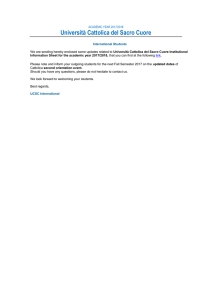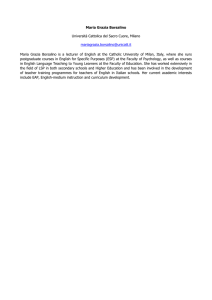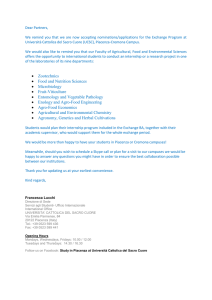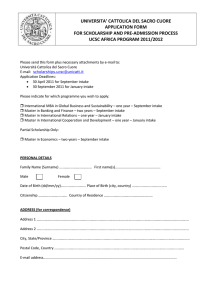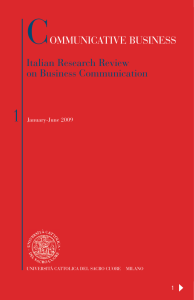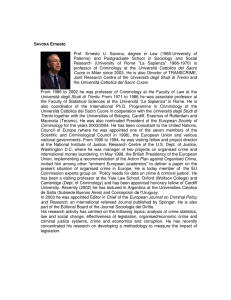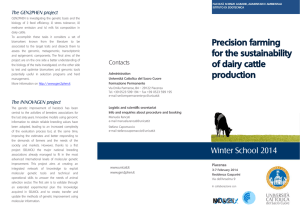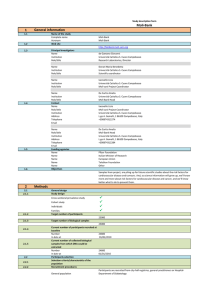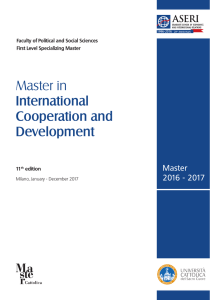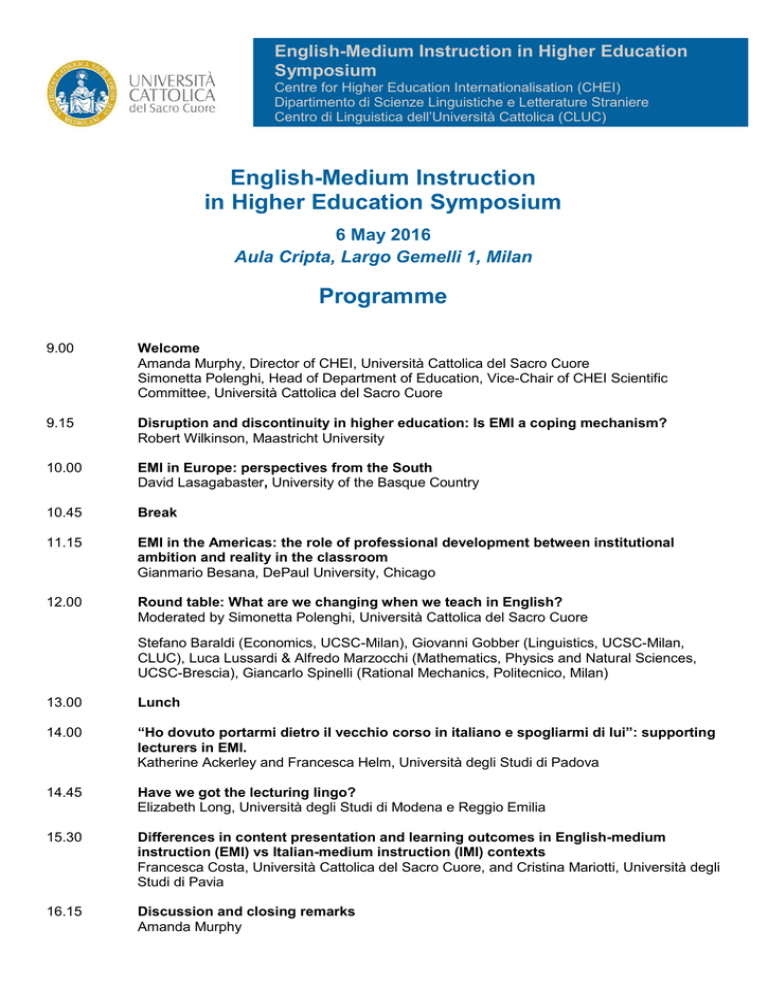
English-Medium Instruction in Higher Education
Symposium
Centre for Higher Education Internationalisation (CHEI)
Dipartimento di Scienze Linguistiche e Letterature Straniere
Centro di Linguistica dell’Università Cattolica (CLUC)
English-Medium Instruction
in Higher Education Symposium
6 May 2016
Aula Cripta, Largo Gemelli 1, Milan
Programme
9.00
Welcome
Amanda Murphy, Director of CHEI, Università Cattolica del Sacro Cuore
Simonetta Polenghi, Head of Department of Education, Vice-Chair of CHEI Scientific
Committee, Università Cattolica del Sacro Cuore
9.15
Disruption and discontinuity in higher education: Is EMI a coping mechanism?
Robert Wilkinson, Maastricht University
10.00
EMI in Europe: perspectives from the South
David Lasagabaster, University of the Basque Country
10.45
Break
11.15
EMI in the Americas: the role of professional development between institutional
ambition and reality in the classroom
Gianmario Besana, DePaul University, Chicago
12.00
Round table: What are we changing when we teach in English?
Moderated by Simonetta Polenghi, Università Cattolica del Sacro Cuore
Stefano Baraldi (Economics, UCSC-Milan), Giovanni Gobber (Linguistics, UCSC-Milan,
CLUC), Luca Lussardi & Alfredo Marzocchi (Mathematics, Physics and Natural Sciences,
UCSC-Brescia), Giancarlo Spinelli (Rational Mechanics, Politecnico, Milan)
13.00
Lunch
14.00
“Ho dovuto portarmi dietro il vecchio corso in italiano e spogliarmi di lui”: supporting
lecturers in EMI.
Katherine Ackerley and Francesca Helm, Università degli Studi di Padova
14.45
Have we got the lecturing lingo?
Elizabeth Long, Università degli Studi di Modena e Reggio Emilia
15.30
Differences in content presentation and learning outcomes in English-medium
instruction (EMI) vs Italian-medium instruction (IMI) contexts
Francesca Costa, Università Cattolica del Sacro Cuore, and Cristina Mariotti, Università degli
Studi di Pavia
16.15
Discussion and closing remarks
Amanda Murphy
English-Medium Instruction in Higher Education
Symposium
Centre for Higher Education Internationalisation (CHEI)
Dipartimento di Scienze Linguistiche e Letterature Straniere
Centro di Linguistica dell’Università Cattolica (CLUC)
Scientific Committee
Mirella Agorni, Università Cattolica del Sacro Cuore
Francesca Costa, Università Cattolica del Sacro Cuore
Amanda Murphy, Università Cattolica del Sacro Cuore
Silvia Pianta, Università Cattolica del Sacro Cuore
Margherita Ulrych, Università Cattolica del Sacro Cuore
Speakers (alphabetical order)
Katherine Ackerley, Università degli Studi di Padova
Stefano Baraldi, Università Cattolica del Sacro Cuore
Gianmario Besana, DePaul University, Chicago
Francesca Costa, Università Cattolica del Sacro Cuore
Francesca Helm, Università degli Studi di Padova
Giovanni Gobber, Università Cattolica del Sacro Cuore
David Lasagabaster, University of the Basque Country UPV/EHU
Elizabeth Long, Università degli Studi di Modena e Reggio Emilia
Luca Lussardi, Università Cattolica del Sacro Cuore
Cristina Mariotti, Università degli Studi di Pavia
Alfredo Marzocchi, Università Cattolica del Sacro Cuore
Amanda Murphy, Università Cattolica del Sacro Cuore
Simonetta Polenghi, Università Cattolica del Sacro Cuore
Giancarlo Spinelli, Politecnico di Milano
Robert Wilkinson, Maastricht University
Recognition by the Italian Ministry of Education
The Symposium is recognized by the Italian Ministry of Education as in-service training.
E’ riconosciuto l’esonero dal servizio per i docenti di ogni ordine e grado, per il personale dirigente ed ispettivo ai sensi dell' art. 64,
c. 4 e c. 5 e dell’art. 67 del CCNL 2006/09.
2
English-Medium Instruction in Higher Education
Symposium
Centre for Higher Education Internationalisation (CHEI)
Dipartimento di Scienze Linguistiche e Letterature Straniere
Centro di Linguistica dell’Università Cattolica (CLUC)
ABSTRACTS (in order of presentation)
Disruption and discontinuity in higher education: Is EMI a coping mechanism?
Robert Wilkinson
Maastricht University, Netherlands
Universities are theoretically ideally placed to manage disruptive change. They construct new
“environments” to cope. The burgeoning of English as a medium of instruction (EMI) can be seen as one
such “constructed environment”.
The unprecedented discontinuity of the past 20-30 years – witness its abstract jargon: massification,
globalization, internationalization, competition, mobility, trade liberalization, ranking, accreditation,
harmonization, competences, and of course ICT – creates a dynamism in which EMI seems to flourish. But
is it a solution?
This paper illustrates the gradual spread of EMI across Europe and elsewhere, taking the growth of EMI in
the Netherlands as an example. The focus will be on the conditions that facilitate and constrain the spread,
including language competence. In particular, it will uncover different approaches to EMI, ranging from
English-taught programmes with little or no focus on the language to fully integrated content and language
programmes (CLIL-like) with dual goals for both content and language.
The paper will address challenges that the universities offering EMI face, including quality of education,
content and language competences, code switching and language meshing, as well as the position of the
national or local language.
EMI in Europe: Perspectives from the south
David Lasagabaster
University of the Basque Country UPV/EHU
English-medium instruction (EMI) programmes are proliferating at great speed in European universities,
although their spread varies considerably from country to country. In this presentation I am going to focus
on Spain, one of the southern European countries in which EMI is more widespread at pre-university than
at university level. In the introduction I will start by briefly making reference to the European context before
concentrating on Spain. After the introduction, the following three sections will revolve around the three
components that, according to Spolsky (2004), make up language policy: language planning, language
practices, and language beliefs. In these three sections I will pay particular attention to how EMI is affecting
the three university bodies: faculty members, students and administration personnel. In the fifth section I
will refer to the research studies undertaken so far with a view to evaluating the impact of EMI on English
proficiency, content learning, and L1 academic literacy. I will wrap up by presenting some final conclusions.
3
English-Medium Instruction in Higher Education
Symposium
Centre for Higher Education Internationalisation (CHEI)
Dipartimento di Scienze Linguistiche e Letterature Straniere
Centro di Linguistica dell’Università Cattolica (CLUC)
EMI in the Americas: the role of professional development between institutional ambition and reality
in the classroom
Gianmario Besana
DePaul University, Chicago
In 2009 DePaul University in Chicago, IL, USA created the “Language and Pedagogy Institute”, a
professional development program for faculty members who are approaching EMI for the first time. The
program was developed in collaboration with a private, elite, catholic institution that used participation in the
program as a reward for productive, interested faculty members.
In 2013, a second large public Mexican institution joined the program. Eager to create traction for EMI in
their institution, the administration relied on LPI as a magic bullet to move their strategy forward.
This talk will address the role and perils of institutional ambition in the implementation of EMI in the
absence of a coherent strategy, and will discuss the importance of both training/professional development
and the development of a structured ecosystem to support EMI practitioners.
“Ho dovuto portarmi dietro il vecchio corso in italiano e spogliarmi di lui”: supporting lecturers in
EMI.
Katherine Ackerley and Francesca Helm
Università degli Studi di Padova
The number of English Taught Programmes is increasing rapidly in Italy as both private and public
universities across the country introduce second and third level degree courses taught in English
(Universitaly). There has been considerable skepticism as regards both the desire and the ability of Italian
lecturers to teach their subjects through English (Argondizzo, De Bartolo and Ting, 2007; Costa, 2012).
Since 2012 the University of Padova Language Centre has offered support services which have been
designed to help university lecturers improve their ability to deliver their courses in English and to reflect on
their teaching. This paper briefly presents two of these services: teacher training in EMI and a lecturer
advising service. Findings concerning the perceived impact of the courses will also be discussed (Ackerley,
Clark, Dalziel & Guarda 2015; Guarda & Helm, 2016).
4
English-Medium Instruction in Higher Education
Symposium
Centre for Higher Education Internationalisation (CHEI)
Dipartimento di Scienze Linguistiche e Letterature Straniere
Centro di Linguistica dell’Università Cattolica (CLUC)
Have we got the lecturing lingo?
Elizabeth Long
Università degli Studi di Modena e Reggio Emilia
Italian universities are embracing the challenges of internationalization in higher education in terms of
strategy, policy and instruction. This talk maps the progress of a medium-sized state institution, l’Università
di Modena e Reggio Emilia (UNIMORE), in three key areas regarding the implementation of English
Medium Instruction (EMI) across campus:
The evolution of lecturer training since 2012 as increasing numbers of academic staff are required
to be involved in English Taught Programmes (ETPs).
Reflections on EMI practice at the Marco Biagi Department of Economics both from lecturers’ and
students’ perspectives (Long, unpublished MA dissertation, 2015).
Presentation of an ongoing action research peer observation project E3 Total Quality Management
being conducted on courses in the Masters Degree in Electrical Engineering.
The presentation provides a snapshot of the current situation in UNIMORE and identifies future implications
and issues to be addressed.
Differences in content presentation and learning outcomes in English-medium instruction (EMI) vs
Italian-medium instruction (IMI) contexts
Francesca Costa (Università Cattolica del Sacro Cuore) and Cristina Mariotti (Università degli Studi di
Pavia)
This paper will focus on the acquisition and presentation of content in Integrating Content and Language in
Higher Education (ICLHE) classes, one of the most debated but least investigated areas in this field of
research. This initial study compares the learning outcomes achieved by 225 students in two Economics
classes taught by the same lecturer throughout one academic year. The first is an L1 (Italian) medium
instruction class, which acts as the control group, while the second, an L2 (English) medium instruction
class, is the experimental group.
The marks obtained by all the students in two identical written exams are analysed in order to ascertain
whether there are any differences in learning outcomes between the control and the experimental class.
Data triangulation is obtained by an interview with the lecturer and by the comparative analysis of the
lecturer’s input presentation strategies in the two groups, collected by means of observations and
transcriptions of the lectures.
The results show that, based on the students’ marks, there are no significant differences in the learning
outcomes achieved by the two groups. Some, although not significant, differences are to be found in the
lecturer’s input as regards the number of interactions, the use of synonyms, the use of paraphrases and the
use of examples in the two groups. According to the interview with the lecturer, no real differences between
the way s/he teaches or in the student composition of the classes were noticed.
5
English-Medium Instruction in Higher Education
Symposium
Centre for Higher Education Internationalisation (CHEI)
Dipartimento di Scienze Linguistiche e Letterature Straniere
Centro di Linguistica dell’Università Cattolica (CLUC)
Contacts
Centre for Higher Education Internationalisation (CHEI)
Università Cattolica del Sacro Cuore
Via Carducci 28/30
20123 Milan
Tel: 02 7234 5116
Email: [email protected]
http://centridiricerca.unicatt.it/chei
Dipartimento di Scienze Linguistiche e Letterature Straniere
Università Cattolica del Sacro Cuore
Via Necchi 9
20123 Milan
Tel: 02 7234.2711
Email: [email protected]
http://dipartimenti.unicatt.it/scienze-linguistiche-home
Centro di Linguistica dell’Università Cattolica (CLUC)
Via Trieste 17
25121 Brescia
Tel: 030 2406.238
Email: [email protected]
http://centridiricerca.unicatt.it/cluc
6

